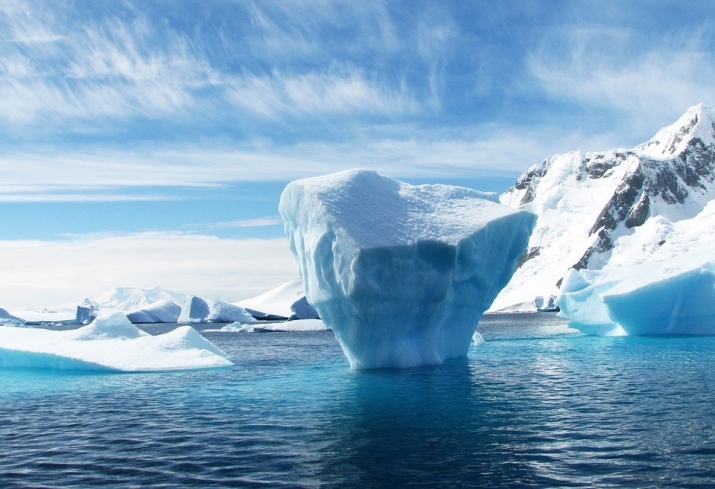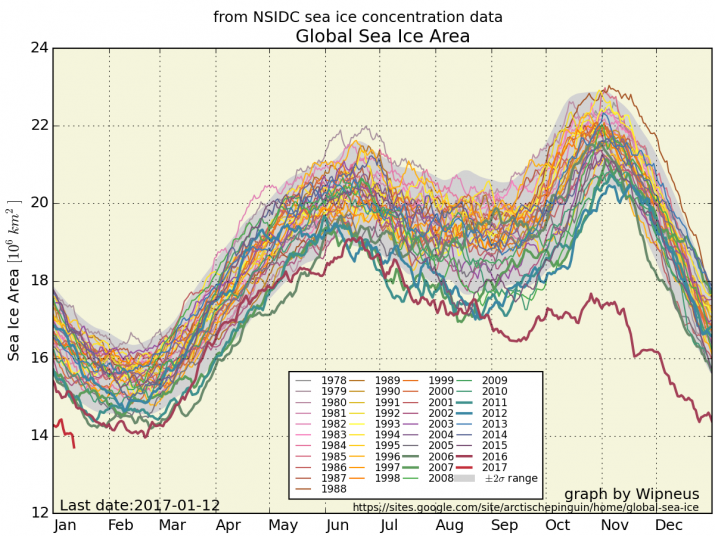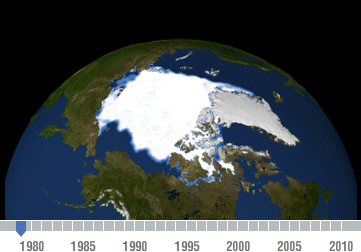NEWS
Global Sea Ice Shrinks to Lowest Level Ever Recorded
 From pixabay.com
From pixabay.comThe total area of the world’s oceans covered by floating sea ice has shrunk to the lowest level since satellite monitoring was introduced in 1978. Beginning with a rapid downturn recorded from September last year, sea ice has since declined to the lowest level on record. Scientists at NASA and the British Antarctic Survey have confirmed that the data is in line with their own observations.
Despite an unexpected increase in Antarctic ice levels in recent decades, sea ice losses in the arctic continue to accelerate, a new NASA study confirms. As a result, Earth as a whole has seen an average annual decline in sea ice of 35,000 square kilometers since 1979, which NASA compared to an area larger than the US state of Maryland every year.
“In the Arctic, there’s definitely that connection between the substantial warming and the substantial sea ice decrease. In the Antarctic case there hasn’t been substantial warming so the connection is not as clear,” said Dr. Claire Parkinson, a senior climate scientist at NASA. “Even though Antarctic sea ice reached a new record maximum this past September, global sea ice is still decreasing. That’s because the decreases in Arctic sea ice far exceed the increases in Antarctic sea ice.” (Climate Home, NASA)
Using data collected by satellites, Dr. Parkinson’s analysis shows that over a 35-year period, not only has the trend in ice extents been downward for all months of the year—even those corresponding to the Arctic and Antarctic sea ice maximum extents— but the decline in global ice has been accelerating. During 1979–96, the sea ice losses totaled some 21,500 square kilometers per year. This rate of loss more than doubled during 1996–2013 to a yearly average loss of 50,500 square kilometers.
“This doesn’t mean the sea ice loss will continue to accelerate,” Dr. Parkinson noted. “After all, there are limits. For instance, once all the Arctic ice is gone in the summer, the Arctic summertime ice loss can’t accelerate any further.” (NASA)
Surface temperatures have increased more than anywhere else on Earth in the Arctic, resulting in an almost continuous decline in sea ice levels. The most recent winter has been exceptionally poor for the annual refreeze. In the Antarctic, meanwhile, the coverage of sea ice has been increasing since records began, although this trend reversed in 2016.
However, scientists caution against attributing conditions in the Antarctic to climate change. “[Antarctica is] probably the worst place on earth to look for a signal of increasing greenhouse gases, because natural variability is so large there," said Prof. John Turner from the British Antarctic Survey. "People have said to me ‘is this global warming suddenly kicking in?’ I don’t think there’s any evidence of that.” He warned against the “real danger in making assumptions from a very short record”, observing that having collected data on the Antarctic for less than 40 years, researchers cannot have witnessed all of the continent’s natural variations: “We have to be aware of the surprises that the system has in store for us.” (Climate Home)
A recent analysis by the National Snow and Ice Data Center, based in Boulder, Colorado, “links Arctic sea ice loss to cumulative CO2 emissions in the atmosphere through a simple linear relationship.” (Discover)
 From neven1.typepad.com
From neven1.typepad.comBased on satellite data, observations from the pre-satellite era since 1953, and climate models, the NSIDC’s findings point to a linear relationship of three square meters of sea ice lost per metric tonne of CO2 released into the atmosphere. The NSIDC is now trying to determine how much of the extreme loss of seas ice witnessed since 2015 can be attributed to greenhouse gas emissions.
“We’re working on it,” said NSIDC director Mark Serreze. “Maybe these are just extreme random events. But I have been looking at the Arctic since 1982, and I have never seen anything like this.” (Discover)
See more
Global sea ice at lowest area ever recorded (Climate Home)
NASA Study Shows Global Sea Ice Diminishing, Despite Antarctic Gains (NASA)
Global sea ice is at lowest level ever recorded (New Scientist)
Global sea ice records broken (again) (Arctic Sea Ice Blog)
New analysis: global sea ice suffered major losses in 2016 (Discover)
Related news from Buddhistdoor Global
Even Christmas Is Not Immune to Climate Change; Scientists Warn of Shrinking Reindeer
Arctic Melt Occurring at an Unprecedented Rate, Experts Warn
Gyalwang Drukpa Warns of Climate Change Threat to Himalayan Water Sources
Vatican Extends a Call to Arms to Buddhists on Vesak Day to Address Eco-crisis
Dalai Lama Lends Weight to Interfaith Climate Change Statement
The Buddhist Monk Who Helped Broker a Global Climate Deal
Buddhist Climate Change Statement Delivered to President Hollande
Related features from Buddhistdoor Global
Buddhistdoor View: The Dharma’s Place in the Global Climate Change Crisis
Buddhistdoor View: The Great Danger and Fear to Come—Global Catastrophe and the Dharma-ending Age
Conscientious Compassion—Bhikkhu Bodhi on Climate Change, Social Justice, and Saving the World
Earth Day and Eco-Dharma: Celebration and Somber Reflection
Buddhistdoor View: Can Buddhists Take the Lead on Climate Change?















